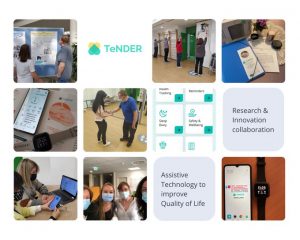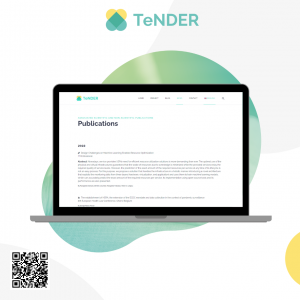
Last year (2020), the World Health Organization’s (WHO) Global Cooperation on Assistive Technology (GATE) launched the Digital and Assistive Technologies for Ageing (DATA) initiative to encourage the global development, synthesis, and use of affordable, quality, digital and assistive technologies to cope with the challenges brought on by ageing.
To explore the wealth of research carried out internationally on digital and assistive technologies for ageing, WHO DATA, in collaboration with the EU’s Health & Care cluster, organised a first webinar on 21 May 2021. The online event brought together ten large-scale pilot projects funded by the European Commission, to show how digital and assistive technologies can be used together to enhance smart and healthy ageing in communities across diverse European contexts.
Researchers and digital experts shared their experience in long term co-design in ageing and large-scale digital health projects. TeNDER, for example, provided input based on our experience developing and implementing meaningful collaboration processes.
Throughout the webinar, speakers underscored the importance of the human component in designing, deploying, and assessing assistive technologies and digital solutions. The presentations shared the vision of research and innovation in the field of health and care and highlighted practical steps to obtain real commitment from decision-makers in the process.
Recent examples of pilots amidst COVID-led restrictions showed the relevance of interoperable technologies to provide tailored and timely solutions to users. Informed discussions were held on technical choices around key performance indicators, service sustainability, services’ innovation, users’ personas and piloting methodologies.
WHO work on digital and assistive technologies
The WHO launched the Digital and Assistive Technologies for Ageing (DATA) to encourage the development of and promote access to assistive technologies for people with impairment or decline in physical or mental capacity, with a particular focus on older people.
Within WHO, DATA brings together perspectives from a number of different departments; including Ageing and Life Course, Digital Health and Innovation, Health Systems and Service Provision, and Health Products, and Policy and Standards.
Working with service providers and users, industry, and civil society, DATA will span boundaries to produce more integrated and cohesive services for older people. If you are interested in exchanging information, sharing knowledge on latest research and contribute to discussion around enabling environment on digital and emerging assistive technologies for ageing we invite you to join the DATA community. The initiative builds on the successful WHO Global Cooperation on Assistive Technology (GATE) and healthy ageing initiatives, and similarly will be applicable low-income, middle-income, and high-income contexts.
EU work on digital and assistive technologies
The Health & Care Cluster gathers ten Large-Scale Pilot projects financed by the European Programme for Research and Innovation, Horizon 2020. The cluster counts 5 working groups focused on Dissemination, Architecture, Use Cases, KPIs (Key Performance Indicators) and GDPR (General Data Protection Regulation). The Health & Care Cluster projects are framed within the OPEN DEI Innovation Action aligning reference architectures, open platforms and large-scale pilots in Digitising European Industry.
Explore the large-scale pilot projects in the Health & Care Cluster:
Tender: affecTive basEd iNtegrateD carE for betteR Quality of Life
Activage: Internet of Things for ageing well
Adlife: integrated personalised care for advanced chronic patients
GateKeeper: Smart data driven solutions for personalized early risk detection and intervention
InteropEHRate: HER in people’s hand across Europe
Pharaon: pilots for active and healthy ageing
Shapes: Smart & Healthy Ageing through People Engaging in Supportive Systems
Smart4Health: Citizen-centred EU-HER exchange for personalized health




